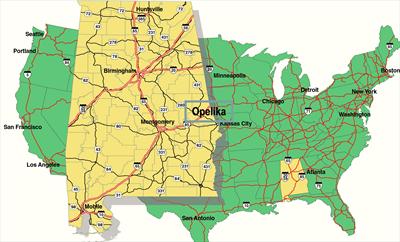 Citizens of Opelika, Beware! Your city government wants to take over control of your appliances, censor and control the Internet, and plant the red flag of socialism at the new Kremlin building — the Opelika City Hall on South 7th Street.
Citizens of Opelika, Beware! Your city government wants to take over control of your appliances, censor and control the Internet, and plant the red flag of socialism at the new Kremlin building — the Opelika City Hall on South 7th Street.
Welcome to another classic battle against municipal broadband competition. All of the usual players have assembled, and the opposition has a overstuffed bag full of tricks — many old, some new, to convince Opelika that bringing additional cable competition to the region is just the worst thing… ever.
 The proposal: to spend $33 million dollars, financed by revenue bonds (not taxpayers), to build a fiber to the home platform to deliver 21st century broadband service and competition to incumbent, recently-bankrupt Charter Cable. The city of Opelika itself would probably not get into the cable business directly. It proposes to work with Knology, a credible cable overbuilder already providing cable and broadband services in Alabama, to manage the day to day operations and handle customers.
The proposal: to spend $33 million dollars, financed by revenue bonds (not taxpayers), to build a fiber to the home platform to deliver 21st century broadband service and competition to incumbent, recently-bankrupt Charter Cable. The city of Opelika itself would probably not get into the cable business directly. It proposes to work with Knology, a credible cable overbuilder already providing cable and broadband services in Alabama, to manage the day to day operations and handle customers.
Why: (from the City of Opelika website) “For many years now – not only during Mayor Gary Fuller’s Administration, but during Barbara Patton’s Administration before him and even Mayor Freeman’s administration before her – numerous complaints were received from citizens about the high prices and poor service they were receiving, while others have complained that they can’t get any cable service in their neighborhoods at all. After years of trying to get other cable/Internet providers to come into Opelika and give Charter Communications competition – to no avail – we decided that the best way to give our citizens competitive services was to offer competition ourselves.” No surprises there. Large cable operators have never challenged one another in their respective markets. Why ruin a good thing by launching a price and services war?
The vote: A referendum on the question will be held this Tuesday, asking citizens to support the project.
Opposition to the project from some quarters has bordered on hysteria, especially from a so-called “consumer grassroots group” and a local website, Opelika’s Smart Grid, that has tried to scare residents into believing city officials are on the verge of taking control of residents’ air conditioners and ovens, unleashing Big Brother on a scale even the most paranoid haven’t even considered.
Stop the Cap! investigated the group claiming to represent the citizens of Opelika, and we came away with more questions than we originally asked.
The local media has accepted, without much challenge, the representations made by these groups opposed to the municipal project. Few questions have been asked about who belongs to the groups and how they are financed. As Stop the Cap! has seen over the past two years, opposition to municipal broadband projects usually comes from coordinated campaigns — a direct attack by lobbyists for the cable and phone companies, and efforts by political groups to demagogue such projects hoping to pick up citizen opposition on philosophical grounds. If Americans for Prosperity, the Heartland Institute, Digital Society, or FreedomWorks is involved, you’ve got political astroturf in action. Since many of these political groups are on the payroll of phone and cable operators, it’s just one more way to achieve the same thing — protection for America’s broadband duopoly.
Who is “Opelika’s Smart Grid” and the Concerned Citizens of Opelika?
 Stop the Cap! has researched both “groups” and discovered they are essentially one and the same. Some of the members of “Concerned Citizens” are also the authors, and primary participants on “The Opelika Smart Grid” website. They are strongly anti-government, and their opposition to municipal services borders at times on the paranoid. Neither group has more than a handful of loosely-associated members, but they do bring along those who share a common, mostly Libertarian/anti-government philosophy. Think “tea parties against municipal broadband.”
Stop the Cap! has researched both “groups” and discovered they are essentially one and the same. Some of the members of “Concerned Citizens” are also the authors, and primary participants on “The Opelika Smart Grid” website. They are strongly anti-government, and their opposition to municipal services borders at times on the paranoid. Neither group has more than a handful of loosely-associated members, but they do bring along those who share a common, mostly Libertarian/anti-government philosophy. Think “tea parties against municipal broadband.”
Domain name records show the website was first registered July 4th, 2010 by William Mayfield who lives on 9th Street in Opelika. Mayfield’s concern about the project’s capability to deliver “smart grid” technology to the local electricity provider prompted him to launch into some pretty far-out conspiracy theories about the implications of the project (taken from Google web cache):
The so-called smart-grid is a government controlled power and information distribution system that combines and monitors the activities of internet, phone and power usage of the customer. This is the vision of socialists like Al Gore and would be a huge step forward for the watching “big brother”. We need to fight this very hard, very quickly.
[…]In government speak motivate = force. And if they determine that you are not worthy of receiving power for whatever reason, like being a reformed Christian, I can assure you they’ll find authority in the “Patriot Act ” to turn your lights out. While this may sound like borderline paranoid ramblings, keep in mind that history shows that the state always takes every chance to increase its power and ultimately uses that power against its own people. Let’s don’t give them the opportunity here.
Mayfield’s tentative writings on his Citizen 10/Limits on Government blog didn’t stay public for long. That blog has since gone private and is now unavailable without an invitation.
Privacy is a major concern, not just for Mayfield, but for virtually all of these “concerned citizens” online. Almost nobody is willing to divulge their real names. In fact, very little about who backs and runs these groups has been disclosed.
Jack Mazzola claims to be a member of Concerned Citizens of Opelika and has become a de facto spokesman in the local press. He claims he is “30 years old and have been a resident of Opelika for almost two years.” During that time, he evidently forgot to update his active Facebook page, which lists his current city of residence as Atlanta, Georgia. Suspicious readers of the local newspaper did some research of their own and claim Mr. Mazzola has no history of real estate or motor vehicle taxes paid to Lee County, which includes Opelika.
The Smart Grid ‘Death Panels-Fear Factor’
Mayfield’s website spends most of its time scaring residents about the implications of municipal fiber as it relates to their electric bills, also ranting about the Kyoto Protocol, carbon footprints, government control of appliances, and socialism generally. While appealing to anti-government and climate change skeptics, average residents pondering the mayor conspiring to turn off their air conditioners from his office might be a bit too over-the-top, so wild claims about spending increases and municipal broadband failures are included as well.
Most of the arguments made by “The Opelika Smart Grid” website and Concerned Citizens of Opelika obfuscate the larger and more important discussion about municipal broadband. They have gained plenty of media attention with their claims and accusations, generating considerable controversy that has little to do with the actual proposal. For cable and phone companies that oppose the project, that represents a gift that keeps on giving. When city officials and proponents of the project are forced to spend time and energy debating and debunking some of the wilder claims, that’s time lost selling the project and successfully explaining it to constituents. For many voters, demagoguery breeds doubt and delivers “no” votes.
Ultimately, for most Opelika residents, the real debate is over competition to area cable and phone companies, not whether Big Brother is going to tell you when you can use your hair dryer.
The Very Wrong Arguments Against Municipal Fiber
 Mayfield’s website attempts to indict municipal fiber projects with a mix of incomplete storytelling, selective editing, and questionable sourcing. The larger argument from the group is that municipal fiber projects always fail leaving taxpayers holding the bag. But the examples provided tell a different story, ranging from ‘comparing apples and oranges,’ condemning systems facing the same financial challenges private providers are coping with during The Great Recession, or even attacking the viability of systems not even operating yet.
Mayfield’s website attempts to indict municipal fiber projects with a mix of incomplete storytelling, selective editing, and questionable sourcing. The larger argument from the group is that municipal fiber projects always fail leaving taxpayers holding the bag. But the examples provided tell a different story, ranging from ‘comparing apples and oranges,’ condemning systems facing the same financial challenges private providers are coping with during The Great Recession, or even attacking the viability of systems not even operating yet.
Some examples they mention and the part of the story they don’t:
- The systems in Provo and Memphis didn’t serve a single residential customer. They were commercial service providers only serving business customers;
- The Burlington system got caught up in the banking crisis and is trying to restructure and refinance its operations;
- The attack on the Bristol municipal fiber system comes from The Heartland Institute, a classic political astroturf operation and an outdated 2007 piece from a political blog.
- The system in Davidson has been written about here before — it is not even municipal fiber. It’s a formerly bankrupt Adelphia cable operation that required substantial rebuilding — spending the same sums Time Warner Cable and Comcast would have spent had they bought it. The investment now has a chance to pay dividends… for residents, not Time Warner Cable, going forward.
The website even attacks a municipal fiber system in Salisbury, North Carolina that has yet to begin service. Calling the project a failure is just a bit premature. The “Smart Grid” folks were hard pressed to find credible sourcing for their attack on Fibrant, but finally settled for some fact-starved nonsense generated from, of all places, the John Locke Society. What’s next — Atlas Unplugged: Ayn Rand’s Treatise on Synchronous Broadband? The group attempted to downplay the connection to the John Locke folks by linking to a content aggregator– Scribd, instead. Now that we’ve mentioned it, they could have credited us as well.
If you are suspicious about the viability of municipal fiber, simply ask yourself if they are such failures, why do phone and cable companies spend millions to lobby against them? Why the blizzard of scare mailers, robocalls, astroturf opposition groups, and lawsuits — all to stop what many opponents continually claim are competitive and operational failures?
The answer is, most municipal projects, like co-ops and community owned utilities, are more than viable. Ask the residents of Wilson, North Carolina who are enjoying the benefits of municipal broadband and cable service even if they don’t become customers. Time Warner Cable didn’t raise rates on the residents of Wilson this year — the only place in the state not to face relentless rate hikes, all because of that community’s municipal provider keeping their competitors honest. Those who do become customers enjoy far faster and more reliable broadband service than either the cable or phone company provides in the region.
Chattanooga, Tennessee is a lot closer to Opelika than Provo is, yet somehow “The Opelika Smart Grid” website missed the success story of EPB, a municipal provider delivering the fastest broadband service in the southern United States. Folks in Lafayette, Louisiana have lots of nice things to say about their municipal provider — LUS Fiber, as well.
Who is Paying for All This?
One important clue that astroturf is being rolled over the municipal fiber debate is the lack of public disclosure about who is financing the muni-broadband haters.
Residents vaguely know the state’s cable companies are bankrolling some of the opposition in the media, taking out full page ads attacking the proposal in the local media “paid for by the ACTA.” It’s up to readers to discern “ACTA” stands for the Alabama Cable Telecommunications Association, the cable industry’s lobbying group in the state. Full disclosure that isn’t.
As far as “Opelika’s Smart Grid” website and the “Concerned Citizens” group, funding sources are more murky, if only because they go out of their way not to be specific.
Stop the Cap! posted a comment asking some questions about the website’s funding sources and backers as well as questioning some of their information. Those questions have not been made public, much less answered, despite subsequent comments written after our own submission. What are they hiding?
Another matter of concern come from the fact these “grassroots” groups have the ability to finance expensive radio ads. They claim they are paid for by “concerned local citizens.” That could easily include Charter Cable, the local phone company, or their representatives. We don’t know because the owners of the website won’t say who those people are. In a tight economy, would you be handing over hundreds, if not thousands of your hard-earned dollars to fight for Charter Cable and AT&T by paying for radio ads? The cable and phone companies and their lobbyist friends sure would.
With no disclosure of real names, no direct statement that there is no industry money or involvement in these opposition websites, and way-too-convenient shared sourcing of “facts” with earlier industry “dollar-a-holler” movements, it would be a major mistake to simply give these “groups” or their arguments the benefit of the doubt.
As we’ve repeatedly uncovered in our own reporting, consumers do that at the peril of their wallets, learning only later they were suckered into opposing competition that could deliver significant savings and better service.
 “Feedback from ISPs who have deployed usage-based Internet tiers has confirmed that two factors are key to success: accurate usage measurement and quick, proactive notifications,” PerfTech vice president of sales Jane Christ said in a statement.
“Feedback from ISPs who have deployed usage-based Internet tiers has confirmed that two factors are key to success: accurate usage measurement and quick, proactive notifications,” PerfTech vice president of sales Jane Christ said in a statement.

 Subscribe
Subscribe













